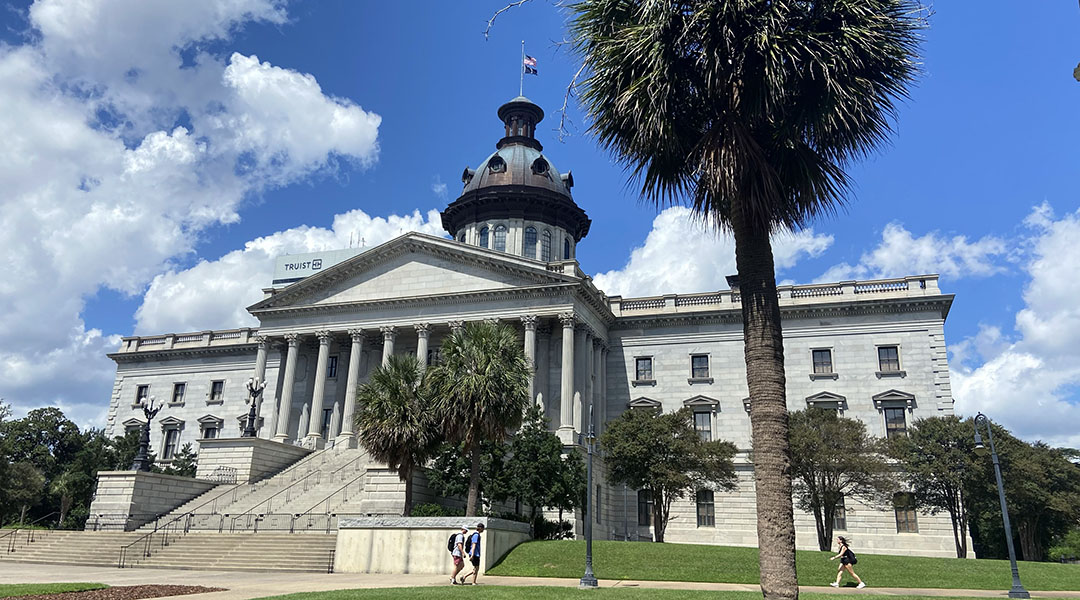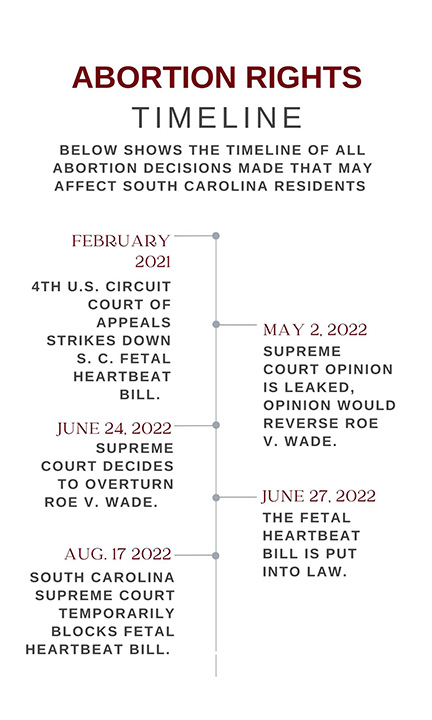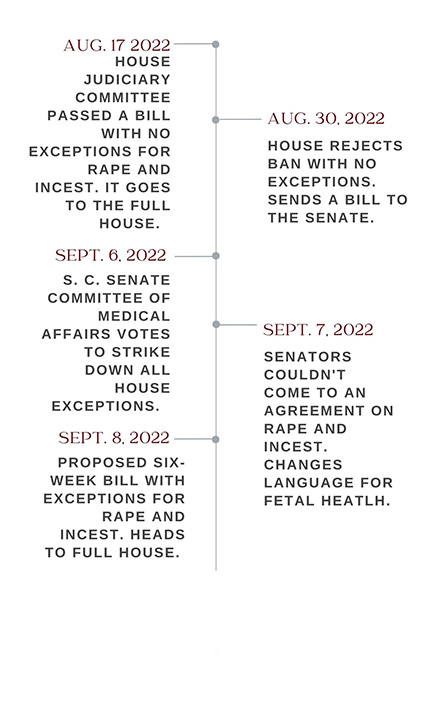Photo of the South Carolina State House. Photo by Julia Goulet
There has been a lot of debate in the South Carolina House and Senate about abortion rights since the Roe v. Wade decision.
Bill H.5399, which would ban abortions after six weeks, left the S.C. Senate and is returning to the S.C. House after Republicans split on how strict the ban should be. Although it was one of the proposals, it’s unlikely that South Carolina would see a total abortion ban in the near future, according to Senate Majority Leader Shane Massey. The six-week ban has been in the works for over a year, but this week it’s back on the table with some changes.
Before the bill got this far, South Carolina legislators furiously reworked the bill’s language. As the bill prepares to go back to the full House for debate, South Carolinians are watching what lawmakers will do.
February 2021
Gov. Henry McMaster signed the S.C. Fetal Heartbeat Bill into law, a previous bill that bans abortions when a doctor can hear a fetal heartbeat, usually around six weeks. The exceptions for this were if the pregnancy was caused by rape or incest or if the mother’s life was in danger.
The 4th U.S. Circuit Court of Appeals in Virginia quickly struck down the bill because it violated Roe, which was still in effect nationally.
May 2, 2022
In an unprecedented breach of U.S. Supreme Court security, the entire draft opinion written by Justice Samuel Alito on the Dobbs v. Jackson Women’s Health Organization, a review of Roe. The draft opinion was released on Politico.com. Dobbs focuses on returning abortion rights to the states after almost 50 years of it being at the federal level.
The leak is still under investigation. There are about 75 people who would have access to an opinion.
“There’s never been a leak like this,” said Jessica Schoenherr, assistant professor of political science at the University of South Carolina. “There’s at least one leaker, if not more – so, completely unprecedented.”
May 12, 2022
Before the opinion was released and the decision made, the South Carolina House introduced a bill called the “Personhood Act of South Carolina,” which states a human becomes a person at fertilization.
This bill was stalled in the House Judicial committee.
June 24, 2022
A little over a month later, the Supreme Court officially released its Dobbs decision. The opinion differed little from the draft opinion, leaving the issue to the states.
Immediately, states such as Texas and Mississippi, along with 11 other states, enacted trigger laws, which immediately put some abortion bans into place. Lawmakers in other states, such as South Carolina, began working on their own new bills.
June 27, 2022
South Carolina passed a version of the Fetal Heartbeat Bill days after Dobbs and after obtaining an emergency motion to do so from the 4th Circuit. Like the original Fetal Heartbeat Bill, this bill adds exceptions for incest, rape, a threat to the mother’s health and fetal anomalies – unexpected conditions in the fetus’s development, such as congenital disabilities. However, in the case of rape and incest, the doctor who performs an abortion would have 24 hours to notify the police and provide the contact information for the woman.
Aug. 17, 2022
The S.C. Supreme Court temporarily blocked the six-week ban after advocates for abortion rights, led by Planned Parenthood and the Greenville Women’s Clinic, filed lawsuits that claimed the bill violated the state constitution. The temporary block allows abortions within the first trimester of pregnancy – about the first 12 weeks – giving anyone who can get pregnant six more weeks to learn of a pregnancy and decide on their future.
Aug. 17, 2022
While the S.C. Supreme Court was in the process of blocking the ban, the S.C. House Judiciary Committee was voting on bill H.5399. The bill contained no expectations for rape or incest. During a committee hearing, five Republican representatives abstained from voting. The bill passed in a 13-7 decision and headed to the full House floor.
Aug. 30, 2022
The full House rejected the proposed bill. Representatives then proposed a six-week ban with expectations for rape, incest and a danger to the mother’s life. These exceptions, however, are limited.
“There is a very narrow exception for rape and incest,” said Ann Warner, CEO of Women’s Rights and Empowerment Network. “An important thing to know is that it requires doctors to report that abortion to law enforcement, which is a really (an) unacceptable violation of the privacy of survivors.”
Sept. 6, 2022
The bill then went to the Senate’s Committee of Medical Affairs.
In a 9-8 vote, the committee ultimately decided to remove the exceptions for rape and incest.
Sept. 7, 2022
In the full Senate, senators did not decide whether to keep a six-week ban or ban abortion altogether. The bill allowed an exception for pregnant women if their fetus would die outside the womb, but there has been no consensus about rape and incest.
Sept. 8, 2022
Then, in a 27-to-16 vote, senators changed the bill’s language to leave in place a six-week ban. But the bill gives a rape victim 12 weeks, not 20 weeks as discussed earlier, to get an abortion. Additionally, it requires a second doctor’s opinion on fetal anomalies, and doctors have to provide the DNA of an aborted fetus to police.
The bill now needs three votes of approval in the House before going to McMaster for his signature. If McMaster wants changes, he must send it back to the House and Senate.




